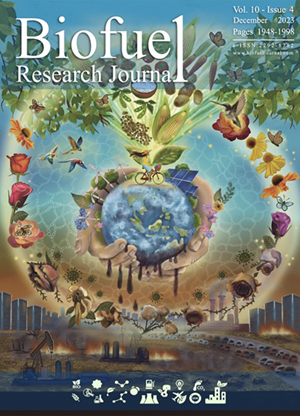生物燃料和生物产品可持续性评估的生命周期评估
IF 11.9
Q1 ENERGY & FUELS
引用次数: 20
摘要
传统上,生物基材料已经使用了几千年。近年来,化石材料和能源的发现和利用超过了它们的使用。然而,由于对矿物资源的不可再生性以及与使用矿物资源有关的温室气体和其他排放的关注,近年来人们对使用生物基材料重新产生了兴趣。如果没有严格的科学评估,生物基材料的环境优势就不能想当然。许多基于能源、经济和环境影响的工具已经被使用。生命周期评估就是开发并成功用于生物燃料和生物产品环境评估的一种工具。然而,许多方法上的挑战,其中包括与系统边界、功能单元、分配和碳核算有关的其他问题,仍然需要进一步研究和考虑。本文对相关问题进行了总结,并讨论了解决这些问题的方向。尽管在评估方法上存在挑战,但与化石燃料相比,生物燃料和生物产品在环境优势方面表现出了希望。这些优势可以通过利用生物质原料的所有部分,特别是通过生物炼制的增值材料和化学品进一步增强。本文章由计算机程序翻译,如有差异,请以英文原文为准。
Life cycle assessment for sustainability assessment of biofuels and bioproducts
Bio-based materials have been used traditionally for millennia. Their use was overtaken in recent times by the discovery and utilization of fossil-based resources for materials and energy. However, concerns about the non-renewability of fossil resources and greenhouse gas and other emissions associated with their use have brought forth a renewed interest in using bio-based materials in recent years. The environmental advantages of bio-based materials cannot be taken for granted without a rigorous scientific assessment. Many tools based on energy, economics, and environmental impacts have been used. Life cycle assessment is one such tool developed and successfully utilized for the environmental assessment of biofuels and bioproducts. However, many methodological challenges, among other things related to system boundaries, functional units, allocation, and carbon accounting, still need further research and consideration. In this work, the related issues are summarized, and the directions for addressing them are discussed. Despite the methodological challenges in their assessment, biofuels and bioproducts show promise in terms of their environmental advantages compared to their fossil-oriented counterparts. These advantages can be further enhanced by utilizing all parts of the feedstock biomass, especially for value-added materials and chemicals via biorefineries.
求助全文
通过发布文献求助,成功后即可免费获取论文全文。
去求助
来源期刊

Biofuel Research Journal-BRJ
ENERGY & FUELS-
CiteScore
22.10
自引率
1.50%
发文量
15
审稿时长
8 weeks
期刊介绍:
Biofuel Research Journal (BRJ) is a leading, peer-reviewed academic journal that focuses on high-quality research in the field of biofuels, bioproducts, and biomass-derived materials and technologies. The journal's primary goal is to contribute to the advancement of knowledge and understanding in the areas of sustainable energy solutions, environmental protection, and the circular economy. BRJ accepts various types of articles, including original research papers, review papers, case studies, short communications, and hypotheses. The specific areas covered by the journal include Biofuels and Bioproducts, Biomass Valorization, Biomass-Derived Materials for Energy and Storage Systems, Techno-Economic and Environmental Assessments, Climate Change and Sustainability, and Biofuels and Bioproducts in Circular Economy, among others. BRJ actively encourages interdisciplinary collaborations among researchers, engineers, scientists, policymakers, and industry experts to facilitate the adoption of sustainable energy solutions and promote a greener future. The journal maintains rigorous standards of peer review and editorial integrity to ensure that only impactful and high-quality research is published. Currently, BRJ is indexed by several prominent databases such as Web of Science, CAS Databases, Directory of Open Access Journals, Scimago Journal Rank, Scopus, Google Scholar, Elektronische Zeitschriftenbibliothek EZB, et al.
 求助内容:
求助内容: 应助结果提醒方式:
应助结果提醒方式:


